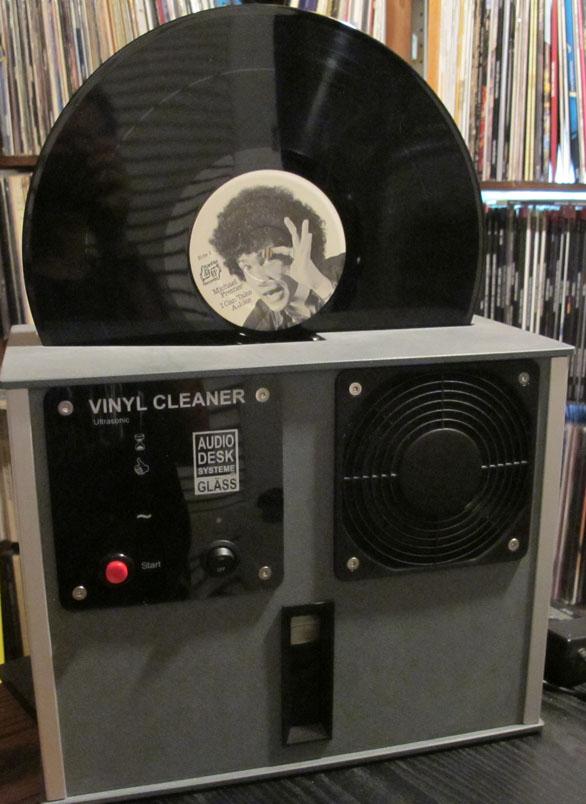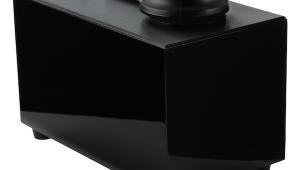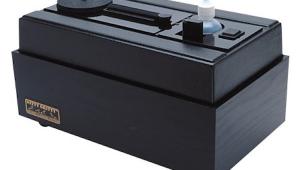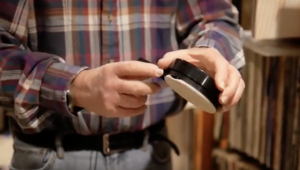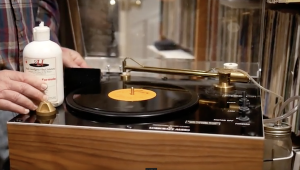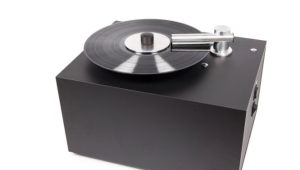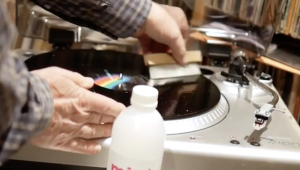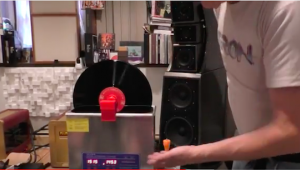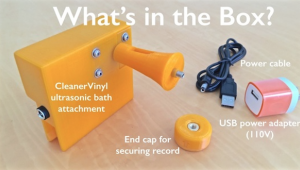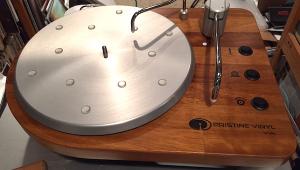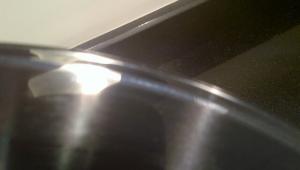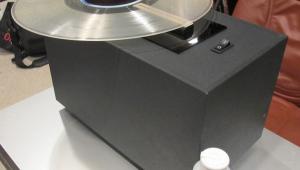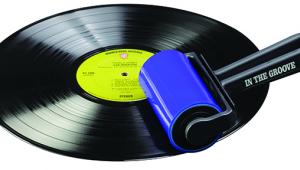The World's Best Record Cleaning Machine?
This compact cleaner can be thought of as a very high tech automatic version of the $80 Spin-Clean Record Washer I reviewed last year. That hand-operated machine uses a fluid vat that cleans many records before the fluid needs replacing as does this one. Like the Spin-Clean, the record sits vertically in the vat and both sides get cleaned simultaneously, but before the manufacturer and importer of this $3895 machine have heart attacks, rest assured those are the only similarities!
This device is fully automatic and unlike any other record cleaning machine I know of, it uses ultrasonics and a process called “cavitation” to clean records much like an ultrasonic jewelry cleaner does likewise for jewelry. If you’ve ever seen a tarnished ornate piece of silver go into such a machine and then come out gleaming, even in the tiniest nooks and crannies, you know how well it works.
Here, you slip a record into a slot lined with soft lips that widen on one side into a vat. Push the “start” button and the record shifts slightly and begins slowly rotating (sometimes it requires a nudge). Fluid stored in a chamber below begins to fill the vat while 4 bi-directional microfiber drums adjust their proximity to the record and then begin rotating, spreading the fluid on the record.
Meanwhile the ultrasonic condenser fires up, producing compression waves the amplitude of which is sufficient to break the liquid’s surface tension causing it to tear apart and leave behind millions of microscopic vacuum bubbles that compress or implode creating tiny liquid jets small enough to clean inside the smallest LP record grooves—think of the jewelry model.
This micro-agitation process displaces any contaminants on the record surface. The fluid is then drained through a filter and the rotation slows almost to a stop as a pair of powerful fans dries the record completely. Remove the record and its clean and dry and ready for play. The entire process, monitored by front panel LEDs, takes six minutes to complete.
The designer, Reiner Gläss contends that both surface suction (Nitty Gritty, VPI, Clearaudio) and point suction (Keith Monks, Loricraft) designs rely upon brushes to loosen dirt and contaminants buried in the record grooves and that brushes simply can’t do the job. Worse, he contends, they often press the dirt further into the grooves. Surface suction vacuuming, he contends, often smears dirt across the record surface while the rubbing friction builds up static electricity. Point suction is somewhat less prone to static build up but is limited to one side at a time cleaning and still relies upon brushing to loosen particles embedded in the grooves.
So how well does the Audio Desk Systeme work? It’s the most effective, easy to use record cleaning machine I’ve ever tried. I bought the review sample. I cleaned already vacuum cleaned records that were still noisy and the noise went away. Two examples: my original UK pressing of “Let It Be” and my most treasured classical album, an original Reiner/CSO “Also Sprach Zarathustra” (LSC 1806). Remarkably, the latter looked clean when I bought it but was hopelessly noisy. Repeated cleanings over decades using more sophisticated fluids and machines have made it quieter but finally, with the Audio Desk, it’s just about completely silent. The machine is too.
The six minute cycle is not an issue because it’s all automatic. I went on a record cleaning spree, managing a record 120 records in two weeks. Not having to stand there and clean and then turn over and clean again made all the difference. You have to remove the record carefully and lift vertically to avoid rubbing against the rollers or you’ll end up with wet spots. That only happened a few times.
Downsides? You are limited to the Audio Desk’s fluid, which is an alcohol free, biodegradable concentrate said to have excellent anti-static properties (verified). You add a small bottle of it ($14.75 per, or $75 for a six pack) to a gallon of distilled (or much better yet reverse osmosis purified water like Aquafina or from your own reverse osmosis system) and that’s good for at least fifty records until you have to start topping up the fluid (a flashing LED tells you when that’s necessary). So you mix up a second batch and add as necessary.
The $99.95 microfiber cleaning barrels need replacing every 500-1000 LPs depending upon how dirty they were to begin with, and you should drain and change the fluid and rinse out the filter every 100 to 200 records. I’m out of space now so I can’t answer the other obvious questions from skeptics other than to say that really dirty, crusty used records should be pre-cleaned. I use Premiér! from Microcare or an Orbitrac and I still keep Enzymatic fluid around to deal with moldy records. I’ve never had so much fun cleaning records!
Since the above review was written back in March of 2012 for publication in the June Stereophile, I have l have cleaned many hundreds of records and have not experienced any problems except as described above and then only occasionally.
I have also cleaned many previously noisy records and most of them came out quiet. Amazing. Yes, it's expensive but if you can afford it, you will not regret your purchase. At this point, it is in my experience, the world's best record cleaning machine.
